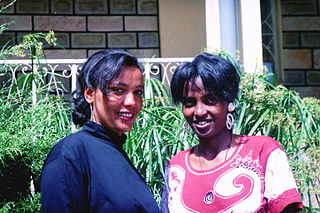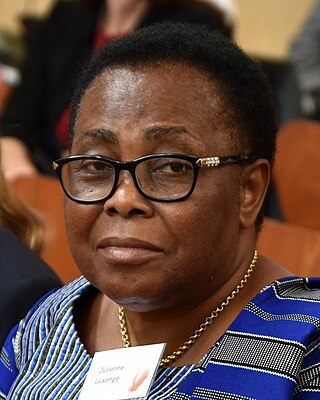Related Research Articles
Gender equality, also known as sexual equality or equality of the sexes, is the state of equal ease of access to resources and opportunities regardless of gender, including economic participation and decision-making; and the state of valuing different behaviors, aspirations and needs equally, regardless of gender.
Islamic feminism is a form of feminism concerned with the role of women in Islam. It aims for the full equality of all Muslims, regardless of gender, in public and private life. Islamic feminists advocate for women's rights, gender equality, and social justice grounded in an Islamic framework. Although rooted in Islam, the movement's pioneers have also utilized secular, Western, or otherwise non-Muslim feminist discourses, and have recognized the role of Islamic feminism as part of an integrated global feminist movement.
Sunila Abeysekera was a Sri Lankan human rights campaigner. She worked on women's rights in Sri Lanka and in the South Asia region for decades as an activist and scholar. Quitting a career as a singer, Abeysekera briefly joined the Janatha Vimukthi Peramuna and then founded the Women and Media Collective in 1984. As head of the INFORM Human Rights Documentation Centre, she monitored human rights violations by all parties in the civil war. She received the United Nations Human Rights Award in 1999 and the Didi Nirmala Deshpande South Asian Peace and Justice Award in 2013.

Monica Mary McWilliams is a Northern Irish academic, peace activist, human rights defender and former politician.

There have been several studies concerning women in Ethiopia. Historically, elite and powerful women in Ethiopia have been visible as administrators and warriors. This never translated into any benefit to improve the rights of women, but it had meant that women could inherit and own property and act as advisors on important communal and tribal matters. As late as the first part of the 20th century, Queen Menen, consort of Emperor Iyasu IV, had a decisive role in running the Ethiopian Empire. Workit and Mestayit regents to their minor sons have been held responsible for their provinces. They owed their rights to landed property because of a special type of land tenure that expected tenants to serve as militia to overlords, irrespective of gender. In 1896, Empress Tayetu Betul, wife of Emperor Menelik II, actively advised the government and participated in defending the country from Italian invasion. Prominent and other landowning women fought against the second invasion in 1935–41. With the assistance of European advisors, women in the ensuing period were kept out of the army and politics, even as advisors. Instead, they were restricted to family and household work of raising children and cooking. With a steady increase in female representation in education, they have started to undertake nursing, teaching, and other similarly supportive roles. Over the 2018–2019 period, their gradual participation in state politics has been increasing at a steady pace.

Women in Armenia have had equal rights, including the right to vote, since the establishment of the First Republic of Armenia. On June 21 and 23, 1919, the first direct parliamentary elections were held in Armenia under universal suffrage - every person over the age of 20 had the right to vote regardless of gender, ethnicity or religious beliefs. The 80-seat legislature, charged with setting the foundation for an Armenian state, contained three women deputies: Katarine Zalyan-Manukyan, Perchuhi Partizpanyan-Barseghyan and Varvara Sahakyan.

Kasha Jacqueline Nabagesera is a Ugandan LGBT rights activist and the founder and executive director of the LGBT rights organization Freedom & Roam Uganda (FARUG). She received the Martin Ennals Award for Human Rights Defenders in 2011 and the Right Livelihood Award in 2015.
Domestic violence against men is violence or other physical abuse towards men in a domestic setting, such as in marriage or cohabitation. As with domestic violence against women, violence against men may constitute a crime, but laws vary between jurisdictions. Intimate partner violence (IPV) against men is generally less recognized by society than intimate partner violence against women, which can act as a further block to men reporting their situation.

Domestic violence in India includes any form of violence suffered by a person from a biological relative but typically is the violence suffered by a woman by male members of her family or relatives. Although Men also suffer Domestic violence, the law under IPC 498A specifically protects only women. Specifically only a woman can file a case of domestic violence. According to a National Family and Health Survey in 2005, total lifetime prevalence of domestic violence was 33.5% and 8.5% for sexual violence among women aged 15–49. A 2014 study in The Lancet reports that although the reported sexual violence rate in India is among the lowest in the world, the large population of India means that the violence affects 27.5 million women over their lifetimes. However, an opinion survey among experts carried out by the Thomson Reuters Foundation ranked India as the most dangerous country in the world for women.

The modern-day character and the historical status of women in Denmark has been influenced by their own involvement in women's movements and political participation in the history of Denmark. Their mark can be seen in the fields of politics, women's suffrage, and literature, among others.

Violence against women in India refers to physical or sexual violence committed against a woman, typically by a man. Common forms of violence against women in India include acts such as domestic abuse, sexual assault, and murder. There are several forms of violence against women, murder, female infanticide, sexual crimes, acid throwing, perpetuation.

Aneesa Ahmed is a Maldivian women's rights activist who was also the first speaker(vice) of People's Majilis from 2004 to 2009.

Rusudan Gotsiridze is a bishop of the Evangelical Baptist Church of Georgia and a women's rights activist. She was the first female Baptist bishop in Georgia. She has advocated against gender violence and for women's equality, and created interfaith dialogues to support religious minorities. She was also one of the first members of the religious community in Georgia to publicly support the rights of the LGBT community. She also spoke at the 6th United Nations Forum on Minority Issues about religious minorities in Georgia.

Fatimata Touré is a women's rights activist and the head of the Regional Forum on Reconciliation and Peace in Gao, Mali. She is also the head of Women's Action, Research, Study and Training Group, which works against fistula.

Sara Hossain is a Bangladeshi lawyer. She is a barrister in the Supreme Court of Bangladesh. She is the honorary executive director of the Bangladesh Legal Aid and Services Trust (BLAST), a major legal aid provider. She has been at the forefront of advocating for women's rights in Bangladeshi courts and played a key role in drafting legal reforms to protect women. She was the plaintiff's lawyer in the landmark case of Bangladesh National Women Lawyers Association (BNWLW) v. Bangladesh, in which the Supreme Court supported the judicial practice of referring to international human rights law in the absence of domestic legislation. She is known for her role in challenging fatwa violence when a fatwa is issued to mete out punishment to women and girls. She co-edited 'Honour': Crimes, Paradigms and Violence Against Women with Lynn Welchman.

Julienne Lusenge is a Congolese human rights activist recognized for advocating for survivors of wartime sexual violence. She is co-founder and President of Female Solidarity for Integrated Peace and Development (SOFEPADI) and director of the Congolese Women's Fund (FFC).

Lucy Kocharyan is an Armenian journalist and blogger known for having taken a stand in her country against gender-based violence. She was chosen as an International Women of Courage in March 2020 by the US Secretary of State, the first Armenian to win this award.

Women's Rights Action Movement (WRAM) is a women's rights organisation based in the Solomon Islands, which campaigns for greater representation of women in politics, as well as advocating for changes to the governance of the country to enable gender parity.

Canan Güllü is a Turkish activist who is the President of the Federation of Women Associations of Turkey (TKDF). She was awarded the International Women of Courage Award in 2021.
Ros Sopheap is a Cambodian women's rights activist. She is the founder and former executive director of Gender and Development Cambodia (GADC), a non-governmental organisation involved in preventing domestic violence against women and promoting women in leadership roles. During her 20-year career with GADC, she advocated on behalf of women in Cambodia and was central to the Cambodian women's rights movement. Sopheap also served as the president of the Committee to Promote Women in Politics.
References
- ↑ "SOLOMON ISLANDS: Solomon Men Learning Wisely to Respect Women | PeaceWomen". 2021-06-09. Archived from the original on 2021-06-09. Retrieved 2021-06-09.
- ↑ Solomon Islands Country Gender Assessment. Asian Development Bank. 2015-11-01. ISBN 978-92-9257-227-3.
- ↑ "Stop Violence Activism Starts - Solomon Times Online". 2021-06-09. Archived from the original on 2021-06-09. Retrieved 2021-06-09.
- 1 2 3 "The new Act finally making domestic violence illegal in Solomon Islands | IWDA". 2021-06-09. Archived from the original on 2021-06-09. Retrieved 2021-06-09.
- ↑ "3 feminist sHEROes driving the women's movement across Asia Pacific | IWDA". 2021-06-09. Archived from the original on 2021-06-09. Retrieved 2021-06-09.
- ↑ Jansen, Henriette (2011). Swimming Against the Tide: Lessons Learned from Field Research on Violence Against Women in the Solomon Islands and Kiribati (PDF). UNFPA.
- ↑ "Women in Central Province Meet to Address Challenges - Solomon Times Online". 2021-06-09. Archived from the original on 2021-06-09. Retrieved 2021-06-09.
- ↑ Our Voice: Women's Participation & Influence in Local Decision Making (PDF). Women's Action for Voice and Empowerment. 2018.